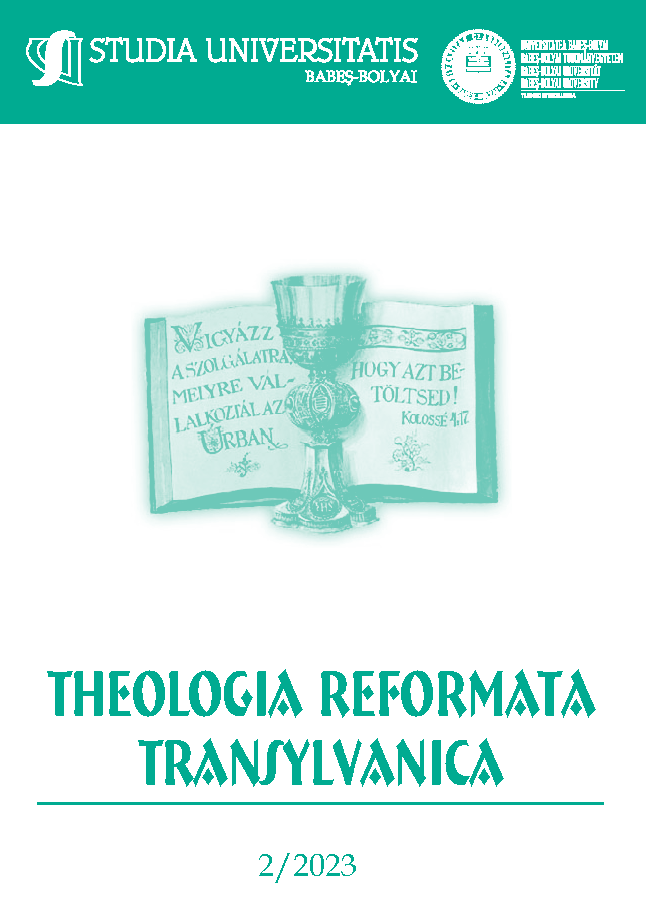Ha ketten csinálják ugyanazt, nem ugyanaz – a segítés női és férfi mintázatai
DOI:
https://doi.org/10.24193/subbtref.2023.2.19Keywords:
pastoral care, helping, theology, psychotherapy, gender, masculine dominance, correlative identityAbstract
If Two Do the Same Thing, It Is Not the Same Thing – Male and Female Patterns of Helping
It is assumed that a professional’ gender has a decisive influence on the need for help, the way of providing help, and the helping relationship. Our aim is to sensitize pastoral care workers and other helping professionals to this perception and conscious recognition. In connection with our topic, we will make some points that we recommend to be mindful of. We will take into account what the theory of science points out: in the studies and theses of the social sciences and humanities, the researcher and the object of research are “structurally identical”.
We will discuss the deforming effects of masculine dominance and some of its implications for the history of science, theology, and the practice theory of helping. Then we discuss the reality of the correlative determination of identity.
We will point out that the far-reaching disregard of feminine and masculine patterns of helping is not unique to pastoral care. A similar omission can be observed in the fields of medicine and psychotherapy training.
Finally, attention is drawn to practical aspects relevant to pastoral care.
References
BREUER, Franz – REICHERTZ, Jo (2001): Wissenschafts-Kriterien: Eine Moderation, In: Foru: Qualitative Sozialforschung 2001/3.
BUNDES Ärztekammer. Frauen sind anders krank: Die Medizin ist auf Männer fixiert - n-tv.de (letöltés dátuma: 2023.8.6.).
BUNDES Ärztekammer statisztikája. 2020-Statistik.pdf (bundesaerztekammer.de) (letöltés dátuma: 2023.9.9.).
BÜHRING, Petra (2022): Gender und Psychotherapie: Blinde Spots sichtbar machen, In: Deutsches Ärzteblatt PP 12/2022.
CHRISLER, Joan C. – MCCREARY, Donald R. (2010): Handbook of Gender Research in Psychology. New York, Springer Science+Business Media.
EVATT, Cris (2003): Männer sind vom Mars, Frauen von der Venus. Zürich, Piper-Vlg.
FRANCK, Norbert (32017): Handbuch Wissenschaftliches Arbeiten. Paderborn, Schöningh.
GLEZERMAN, Marek (2018): Frauen sind anders krank. Männer auch: Warum wir eine geschlechtsspezifische Medizin brauchen. Berlin, Mosaik.
JAFFEE, Sara – SHIBLEY, Janet (2000): Gender Differences in Moral Orientation: A Meta-analysis, In: Psychological Bulletin. 126. 5(S). 703–726.
MAO, Jiuxing (2011): Sinnliche Subjektivität bei Kant. Eine Studie vor dem Hintergrund der Phänomenologie Husserls. Heidelberg, J.B. Metzgers.
MITSCHERLICH, Alexander (1963): Auf dem Weg zur vaterlosen Gesellschaft. München, R. Piper & Co Verlag.
NIEDENTHAL, Paula et al. (2006): Psychology and Emotion, In: Principles of Social Psychology (series). New York, Psychology Press.
SAUERBREY, Julia (2012): Geschlechterunterschiede in Kooperation und Wettbewerb. Gemeinsam und gegeneinander: Geschlecht, Gene und Gesellschaft. München, Akademische Verlagsgemeinschaft.
STOLLBERG, Dietrich (1992): Ein Mann ist keine Frau. Zur Infragestellung der männlichen Identität in einer sexistischen Gesellschaft, In: Wege zum Menschen. 44. 8(S). 484–491.
STUDIENZENTRUM der EKD für Genderfragen in Kirche und Theologie adatai, Simone_Mantei_Vortrag_zur_Praesentation_der_Handreichung.pdf (geschlechtergerechtigkeit-nordkirche.de) (letöltés dátuma: 2023.8.8.).
VAN VUGT, Mark (2006): Gender Differences in Cooperation and Competition: The Male-Warrior Hypothesis, In: Psychological Science. 18. 1(S). 19–23.
VOSS, Angelika (2007): Frauen sind anders krank als Männer: Plädoyer für eine geschlechtsspezifische Medizin. Irisina Verlag.
WILSON, E. O. (1975). Sociobiology: The New Synthesis. Belknap Press of Harvard U Press.
Downloads
Published
How to Cite
Issue
Section
License
Copyright (c) 2023 Studia Universitatis Babeș-Bolyai Theologia Reformata Transylvanica

This work is licensed under a Creative Commons Attribution-NonCommercial-NoDerivatives 4.0 International License.






